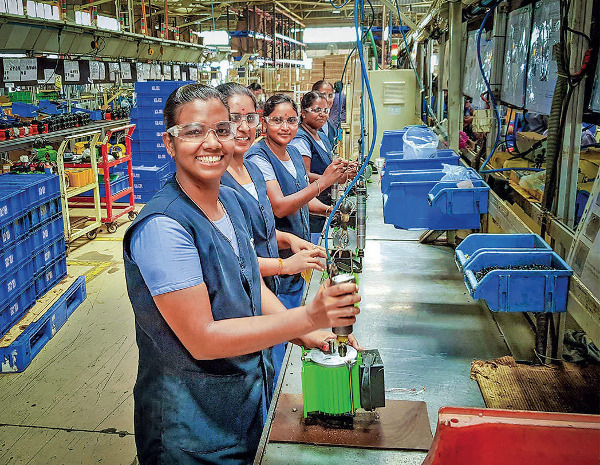Prioritization of gender diversity and concerted efforts, such as return-to-work and mentoring programmes for women, implemented by companies across India have had a positive impact on gender diversity ratios, according to the Zinnov-Intel Gender Diversity Study 2019.
Representation of women in corporate India has increased from 21% five years ago to 30% now, with higher representation in non-technical roles (31%) over technical roles (26%), the study by management consulting firm Zinnov, in collaboration with Intel India, has shown. However, only 11% of senior leaders are women, compared with 20% in mid-level roles and 38% in junior roles, it said.
The number of women on company boards has increased from 5% in 2012 to 13% in 2018, according to the study, which evaluated 60 companies, including global capability centres (GCCs), technology service providers and startups, and analysed various organisational policies and practices. This, it said, was primarily because of the mandate of having at least one woman on every company’s board of directors.
Large firms, the study said, have the highest gender representation at 33%, while medium-sized ones have 27%, and small companies only 21%. About 25% of the employees of global multinational corporations, or MNCs (organizations of international origin that have a presence in India), are women, while women make up only 30% of the workforce in domestic MNCs and 31% in non-MNC firms.
Gender diversity is higher in tier-I cities at 31%, while it is around 25% in tier-II and tier-III cities. Bengaluru leads with 34%, followed by Mumbai with 33% and Pune 32%.
The study focused on the huge gender disparity that continues to exist in Indian workplaces, and pointed out that most companies surveyed have been running diversity programmes for many years, which has led them to make modest progress.
It also revealed that the increase in gender diversity ratios is steepest in the non-MNC category, especially in startups. Startups typically do not focus on gender-based hiring when at small scale, as they aim to quickly take on the best talent regardless of gender, the study added.
Intel India has made efforts to reduce the gender gap, as a result of which 25% of its employees are women. “At Intel India, our gender diversity efforts go beyond hiring, retention and development of talent, to also include supporting women innovators and entrepreneurs and strengthening the technical pipeline to encourage more women to enter and succeed in the workplace,” said Nivruti Rai, country head, Intel India, and vice-president of the Data Center Group, Intel Corp.
“A key initiative that we have taken up in this space is Be-WISE (Women Innovators, Social Leaders and Entrepreneurs), which aims to accelerate inclusive participation of women in the workplace,” she said.
Commitment to diversity and inclusion is also critical to the success of SAP Labs India, according to Sindhu Gangadharan, its senior vice-president and managing director. “To make SAP an employer of choice for more women, we have introduced a series of programmes and policies that support the needs of our women employees at every stage of their career, paying particular attention to their times of transition like life events or critical career moments to help them navigate these changes,” Gangadharan said.
“We have 26% women in the senior leadership team, and we are working towards increasing that,” she said.
Source: LM
Image Courtesy: ET
You may also like
-
Trade Connect E-platform For Exports Is Single Window, Fast, Accessible And Transformational: Shri Piyush Goyal
-
Dot Simplifies Approval Processes For Telecom Licenses And Wireless Equipment
-
Coal Production and Supply Trends on Positive Trajectory
-
Union Minister To Release Booklets On Promotion Of Indigenous Species & Conservation Of States Fishes
-
2nd India-Japan Finance Dialogue held in Tokyo on 6th September, 2024
